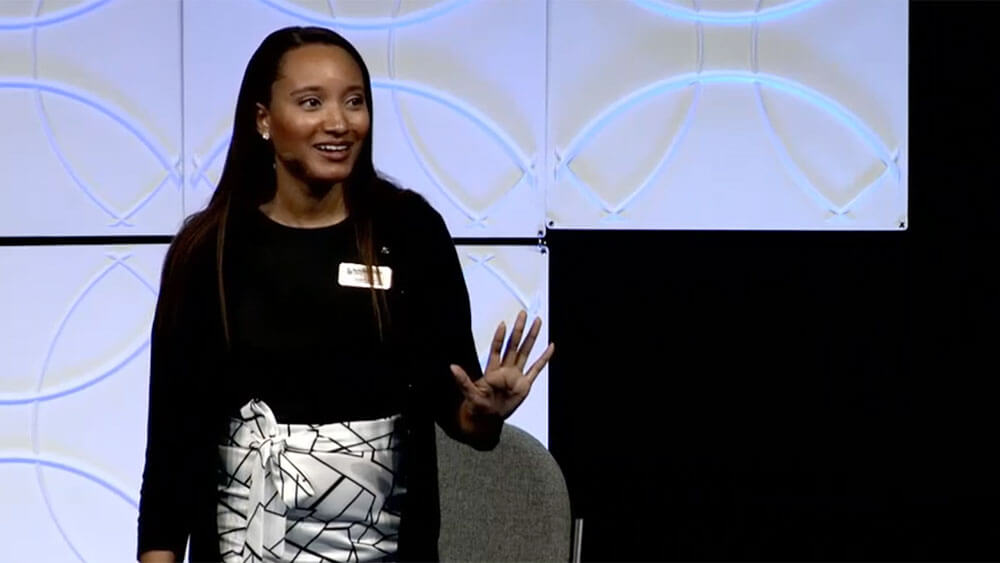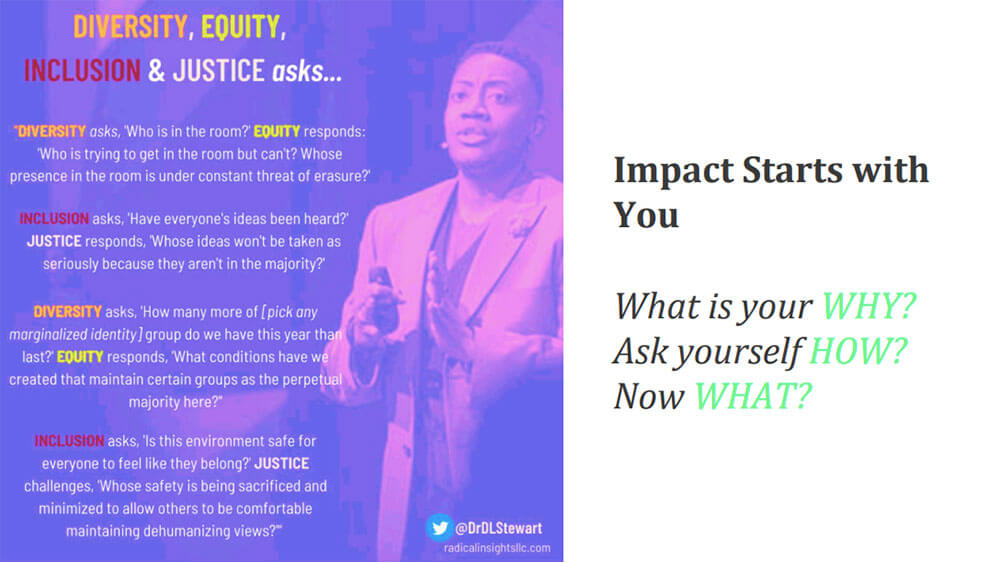
Justice is key everywhere, but is especially important in the event industry, Tanya Gibson of Big Brothers Big Sisters of America told the EduCon 2021 audience.
As organizations work to improve their diversity, equity, and inclusion efforts, there is a fourth goal that is less talked about but just as important to the workplace: justice. Tanya Gibson, who spoke at EduCon 2021 on July 8, incorporates the goal of justice into her title as vice president of JEDI — justice, equity, diversity, and inclusion — and human resources at Big Brothers Big Sisters of America.
Justice is key in all industries, but is especially important in the event space, an organization centered on people, Gibson said. “Your organizations — and the activities and events that you plan — are rooted in justice,” she said. “You may not think of it that way today, but as you move through your work, think of everything that you do as building fairness for all, in your own unique way. Think of the people coming into your rooms. Think about the language that you use, the marketing that you use, the workshops you are providing, who is included in those conversations, and who makes the decisions. That becomes your JEDI story.”
Justice, Gibson said, is about fairness, balance, and “dismantling those barriers to resources and opportunities in society so that all individuals — that’s key in these conversations, that everyone — all individuals and communities, can live a full and dignified life,” she said. “That’s what’s what it means to be in our case, a JEDI warrior — you’re dismantling those barriers and being a disruptor and doing it in a way that makes sense for your organization.”
Though Gibson acknowledged that becoming a disruptor and doing JEDI work can be uncomfortable, she offered a framework to get started: Four Bs of Impact.
Belief. JEDI is “learned through your environment,” Gibson said. “That’s why perspective is so important — it’s driven by your value system. My color doesn’t wash off and neither does yours, but your belief system and the environment in which you grew up, and the things that you’ve learned — possibly you need to unlearn some of them.”
Behavior. “That’s the action you take, but more importantly, the inactions that you take,” Gibson said. “Folks of color, we see when our white counterparts don’t take action, and we move a couple of steps further back, because we’ve lost that trust. We need you, white co-conspirators, to be those disruptors in the room,” she said, calling those individuals “upstanders.” She added that if white people see or hear something they know is wrong, it is imperative that they say or do something to change it. “Inaction is what’s harming this work and moving progress a little further back.”
Bias. “The biases we have are part of that belief system,” Gibson explained. She suggested taking the Harvard Implicit Bias test to learn more about the biases we all carry with us. “No one’s going to judge you. It’s not stored anywhere, and has all kinds of different biases tests that you can take to see, ‘How biased am I?’ or ‘Where do I need to start on my journey?’” For example, some might need to take further steps to become better acquainted with the needs of the LGBTQIA community. “I’m still there. I still gender folks,” Gibson admitted. “If you’re not comfortable with race stuff yet, maybe start by identifying yourself with your pronouns. And if you’re really not there yet, maybe just start with reading a book, or [listening to] a podcast that maybe is from an influencer outside of your race or ethnicity.”
Barriers. Gibson noted that barriers can often be the most difficult aspect of incorporating JEDI into an organization. “As someone who is a practitioner in this work, I often look at the physical barriers to things and think, ‘Are we including everyone? How are we excluding folks? Are there closed captioning for our folks who are virtually listening in to today’s workshops, and throughout the entire event? How accessible is it for folks who are differently abled? Have we even thought about that? For someone who’s using a physical mechanism to get from workshop to workshop, did we see how long it would take from one break to another for someone who needs to roll their wheelchair from one workshop to another, or go from lunch back to their hotel room?’ Those are the things that keep me up at night,” Gibson said. “How do we make things more equitable for folks that don’t look like me, that have different abilities and different perspectives?” That’s how event planners can become “JEDI warriors,” she said. “Individual baby steps make a huge impact over time.”
JEDI has many meanings and interpretations, Gibson said, but at Big Brothers Big Sisters of America it is “who we are,” Gibson said. “It’s not a slogan, it’s not a marketing campaign. … Maybe your organization is not ready yet to talk about JEDI, but maybe you are waiting to talk about your self-work, and how you can move that needle forward. It’s going to be different for everyone, but make sure that it’s authentic and it’s intentional.”
EduCon 2021 took place July 7-9 at the JW Marriott Desert Ridge in Phoenix and online. If you are a registered attendee, you can view sessions on demand until August 30 at the EduCon website.

Tanya Gibson left the audience with an explanation of justice, equity, diversity, and inclusion from scholar, educator, and activist D-L Stewart, Ph.D.
Casey Gale is associate editor at Convene.
